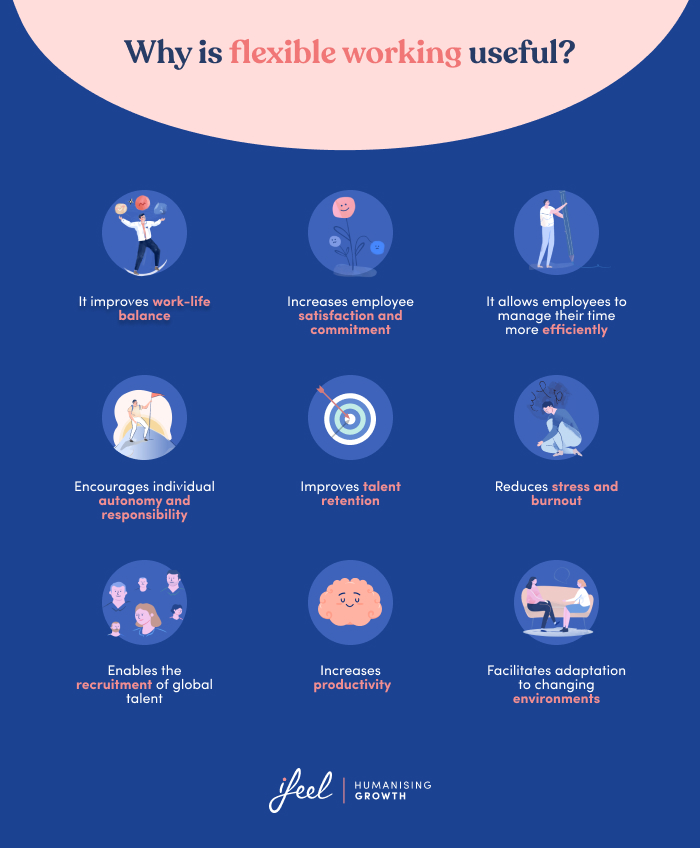How employers and employees understand workplace flexibility has significantly changed in recent years. As in other aspects of company life, the pandemic has accelerated changes or, at least, reflections prior to those changes, which are intended to lead companies to better adaptation to current circumstances.
In this context, workers’ conceptualisation and prioritisation of their needs are changing, and organisations are trying to respond to this new mentality.

Why is workplace flexibility useful?
It is easy to think that customising your workplace is one of the professional dreams of any employee in any company and productive sector.
However, at ifeel, we know that for this to happen, it is essential that the employee in question knows what they want or need to work better, i.e., to have a better life. They must also know how to define it operationally and feel authorised to request it from their company.

The connection between companies and employees
Moreover, workplace flexibility cannot exist in a rigid organisation that is only concerned with the quality of its employees’ professional profiles and disconnected from their characteristics and circumstances. In other words, a company is disconnected from real employee benefits and installed in a rigid vision of the relationship between the organisation and the people who form it.
Let’s look at the lessons of nature and architecture. For example, it escapes no one’s notice that if reeds were rigid, they would not withstand any storm. Similarly, buildings constructed in seismic zones need solid foundations and, more importantly, a great capacity to withstand the ground’s tremors and keep up with them so as not to collapse completely.
Labor flexibility as a means of adaptation
Companies that provide their employees with the right conditions for workplace flexibility are the ones that are adapting best to the labor disasters we are experiencing today. It is as if they know how to read the ground’s vibrations, the power of hurricanes, and the degree of inclination that they must allow their walls not to collapse when problems appear.
Traditionally, workplace flexibility has been understood in a relatively narrow way. A few schedule modifications here and there, some economic modifications… little else. Today, however, the needs expressed by workers regarding their well-being at work are broadening the understanding of workplace flexibility.
Ways to apply workplace flexibility
| Ways to apply flexibility at work | ||
| 1. | Adapting the timetable | The schedule remains the main arena for establishing an efficient dialogue between the needs of employees and the company, not only in terms of the time of arrival and departure but also in terms of the number of hours that actually need to be worked each day to achieve the objectives. Therefore, HR managers, today can (and should) consider new ways of using and allocating time to be efficient. |
| 2. | The workplace | This has a lot to do with the second critical scenario in which we look at workplace flexibility: where the work happens. Many companies are unable (or unwilling) to develop new work formats that provide their employees with greater work flexibility. Others, however, openly discuss with team members what is best for them at any given time: on-site, remote work, or a hybrid model. |
| 3. | Organisation at work | Work flexibility also refers to the ability of employees to design their own agenda of objectives, depending on the particular control they want to exercise over their time and the results they wish to achieve in terms of salary and financial and emotional performance. |
In short, HR managers who understand the new flexible work arrangements will have a secret weapon at the disposal of their teams. This can make the difference between being at the mercy of the wind and earthquakes or being able to adapt smoothly to the demands of the moment.

Caring for mental well-being in organisations
At ifeel, we know that companies are successful when they know how to adjust their operating strategies to the changing circumstances of the people who make up their teams.
To assist in this process, our team of psychologists specialising in mental well-being has developed a mental well-being program for companies aimed at helping companies enhance employee engagement and boost productivity.
This collaboration allows HR managers to receive personalised, data-based advice on the most effective measures for detecting employee mental health issues and assessing the workplace climate. It’s the best way to understand their needs.
Moreover, ifeel’s corporate mental well-being solution offers employees a structured mental health care service tailored to their needs at any given time.
We hope you found this article on workplace flexibility interesting. If you want more information about our mental well-being solution for companies, simply request it, and we will contact your team soon.









